by Rev. Stephen Preus
 The lines were already drawn. Even before the meeting at Marburg, Martin Luther and Ulrich Zwingli had each written forcefully against the position of the other regarding whether the true body of Jesus Christ was present in the Lord’s Supper. In what came to be known as the Great Controversy, it was clear that Luther and Zwingli could not come to agreement on this doctrinal issue.[1] Even so, the Marburg Colloquy took place October 1-4, 1529 at Marburg Castle, Hesse, Germany.
The lines were already drawn. Even before the meeting at Marburg, Martin Luther and Ulrich Zwingli had each written forcefully against the position of the other regarding whether the true body of Jesus Christ was present in the Lord’s Supper. In what came to be known as the Great Controversy, it was clear that Luther and Zwingli could not come to agreement on this doctrinal issue.[1] Even so, the Marburg Colloquy took place October 1-4, 1529 at Marburg Castle, Hesse, Germany.
Why the meeting, though, if there was no chance for agreement? For Zwingli there was room for compromise. He disagreed with Luther that Jesus is present with His true body and blood in the Lord’s Supper, believing it to be a mere memorial meal. Zwingli did not see this as church-divisive, though. Perhaps more important for Zwingli was the great political advantage to having Luther and his followers on his side.[2]
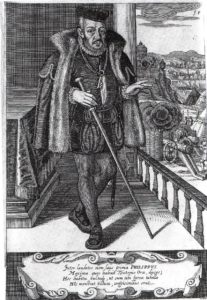 Luther, for his part, was highly skeptical of the colloquy specifically because of its political underpinnings. Philip of Hesse, the landgrave, also had political aims in desiring the colloquy. It would provide a strong Protestant alliance that worked in his favor. Knowing Luther’s skepticism, Philip had convinced Elector John of Saxony that his purpose for desiring the colloquy was an issue of Christian duty to seek peace and unity and not purely political. Thus it was that Luther agreed to the meeting at the behest of his elector, still with sincere suspicion.[3]
Luther, for his part, was highly skeptical of the colloquy specifically because of its political underpinnings. Philip of Hesse, the landgrave, also had political aims in desiring the colloquy. It would provide a strong Protestant alliance that worked in his favor. Knowing Luther’s skepticism, Philip had convinced Elector John of Saxony that his purpose for desiring the colloquy was an issue of Christian duty to seek peace and unity and not purely political. Thus it was that Luther agreed to the meeting at the behest of his elector, still with sincere suspicion.[3]
After all arrived in Marburg and pleasantries and preliminary matters were discussed, the colloquy began officially on Saturday, October 1, 1529. Philip of Hesse was there, and at a table in a living room in the Marburg Castle sat Luther and Melanchthon on the one side and Zwingli and Oecolampadius on the other.[4] Agreeing to lay aside animosity, they proceeded in a manner befitting Christian debate.
It is important to note that “Luther went to Marburg, not as a negotiator, but as a confessor—not as a confessor of some private opinion, but of the Word of God.”[5] This was evident from the very start. Luther spoke first and among his introductory remarks were these words:
“I am prepared, then, to take part in a debate. Not as if I were desirous of changing my conviction, which, on the contrary is absolutely firm. Still, I want to present the foundation of my faith and show where the others err.”[6]
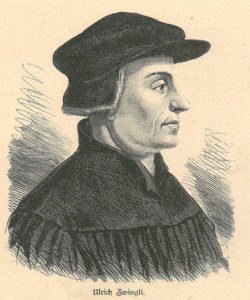
To our contemporary ears this might trigger a strong reaction that Luther was unreasonably stubborn. Stubborn, yes, but in a good way, for to be stubborn and immovable on God’s Word is a virtue of our Lord Jesus Christ (John 10:35).
Luther carried on by addressing not the Lord’s Supper, but his opponents’ errors in teaching regarding the Trinity, the two natures in Christ, original sin, Baptism, justification, the oral word and ministry of the word, and purgatory.[7] Oecolampadius and Zwingli denied there were divisions on these matters and asked that they begin instead with the article at issue, the Lord’s Supper. Luther agreed, but not without testifying publicly that he disagreed with the writings of these men on the above articles.
Proceeding to the article of the Lord’s Supper, Luther cut right to the chase, saying:
“I do not ask how Christ can be God and man, and how his natures could be united. For God is able to act far beyond our imagination. To the Word of God one must yield. It is up to you to prove that the body of Christ is not there when Christ himself says, ‘This is my body.’ I do not want to hear what reason says. I completely reject carnal or geometrical arguments, as for example, that a large body could not fill a small space. God is above and beyond all mathematics, and his words are to be adored and observed with awe. God, however, commands: ‘Take, eat; this is my body’. I request, therefore, a valid proof from Holy Writ that these words do not mean what they say.”[8]
At this point Luther then wrote the words “This is my body” (hoc est corpus meum) on the table with chalk, placing the tablecloth over it. From the plain meaning of these words he would not budge.
During the four sessions from October 2-October 4 the theologians on each side of the debate argued their cases. We cannot cover all the arguments, but we will consider two: 1) what kind of eating happens in the Lord’s Supper and 2) whether Jesus’ body can be present in more than one place at a time.
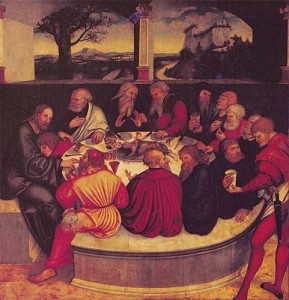 1) Oecolampadius and Zwingli began by arguing that John 6:63, where Jesus says, “It is the Spirit who gives life; the flesh is no help at all,” means that there is a beneficial spiritual eating of Jesus in the Lord’s Supper, but no bodily eating. “I marvel how you can say that the body is eaten orally. If he is present, he is present for the comfort not of the body, but of the soul,” Zwingli said.[9] Again he stated, “We say it is impossible to understand the words of the Lord’s Supper literally because God has forbidden us to eat his flesh bodily.”[10] Zwingli said Jesus spoke with a trope, a metaphorical expression.
1) Oecolampadius and Zwingli began by arguing that John 6:63, where Jesus says, “It is the Spirit who gives life; the flesh is no help at all,” means that there is a beneficial spiritual eating of Jesus in the Lord’s Supper, but no bodily eating. “I marvel how you can say that the body is eaten orally. If he is present, he is present for the comfort not of the body, but of the soul,” Zwingli said.[9] Again he stated, “We say it is impossible to understand the words of the Lord’s Supper literally because God has forbidden us to eat his flesh bodily.”[10] Zwingli said Jesus spoke with a trope, a metaphorical expression.
Luther agreed that there was a spiritual eating of Jesus’ body that we do by faith, but disagreed that there was no eating of the body of Christ orally in the Lord’s Supper. His reasoning was simple: Christ said it.
“Whenever God speaks to us, faith is required, and such faith means ‘eating’. If, however, he adds bodily eating to that, we are bound to obey. In faith we eat this body which is given for us. While the mouth receives the body of Christ, the soul believes the words when eating the body.”[11]
Refusing to shift from the words “This is my body,” Luther stated that he is perfectly aware how unfathomable this is to human reason.
“Furthermore, if you say that God does not propose to us anything incomprehensible, I would not admit that. Consider the virginity of Mary, the remission of sins, and many similar matters. In the same way ‘This is my body’ is also incomprehensible.”[12]
Frustrated at Luther, Zwingli bitterly told him that this verse from John 6 would break his neck,[13] to which Luther replied, “Do not be conceited. Necks do not break so easily here.”[14]
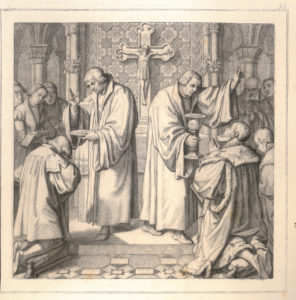
König, Gustav Ferdinand Leopold. 1900. The life of Luther in forty-eight historical engravings. St. Louis: Concordia Publishing House, 119
2) The Zwingli camp also argued that since Jesus has bodily ascended into heaven, he cannot be bodily in the Sacrament too. “For one and the same body cannot be in several places at the same time,”[15] Zwingli argued. Luther once again stuck to his main argument:
“It annoys you that I always stick to the words ‘This is my body’. I am not doing this without consideration. I confess that the body is in heaven, but I also confess that it is in the Sacrament. I desire to stick to these words that Christ is in heaven, and that he is in the Sacrament. I do not ask what is against nature, but only what is against the faith.”[16]
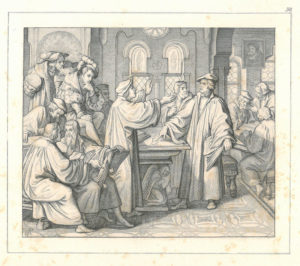
With unbending persistence Luther continually told the Zwingli camp that he was not interested in their natural reason and their mathematics. “Let us not try to inquire how Christ’s body is in the Lord’s Supper…. God is higher than all mathematicians.”[17] Zwingli insisted that Luther provide proof for his position, at which point Luther in dramatic fashion lifted the table cloth and read the words he had written in chalk, “Hoc est corpus meum,” and said to Zwingli,
“This is our Scripture passage… I cannot pass over the text of my Lord Jesus Christ, but I must confess and believe that the body of Christ is there. Zwingli says this must be meant locally then. Luther says he has nothing to do with mathematics.”[18]
Luther simply would not delve into philosophical argument with Zwingli on the possibility of the real presence of Jesus’ body in the Sacrament. This became somewhat comical when Zwingli said to Luther, “Prove, I pray, that the body of Christ can be in many places.” Luther tersely replied, “This is my body.”[19]
It really was that clean cut to Luther, and the colloquy went nowhere. Luther thanked Oecolampadius for being so friendly in discussion, Zwingli less so because of his bitterness. However, both Luther and Zwingli requested forgiveness for any words unbecoming of Christian conversation.[20] Before the respective sides left Marburg, the political animal Philip of Hesse desiring some sort of agreement, the Lutherans drafted what became known as the Marburg Articles. These articles proved useless, however, both sides disagreeing into the future as to what each article actually meant. The gulf between Luther and Zwingli was too large to ignore.
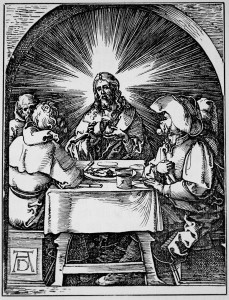 The lines were drawn before the Marburg Colloquy, and afterwards nothing came of it except what Luther had intended with it all along: “I want to present the foundation of my faith and show where the others err.” God grant that we seek the same as we confess God’s Word as Lutherans today.
The lines were drawn before the Marburg Colloquy, and afterwards nothing came of it except what Luther had intended with it all along: “I want to present the foundation of my faith and show where the others err.” God grant that we seek the same as we confess God’s Word as Lutherans today.
The Rev. Stephen K. Preus is pastor of Trinity Lutheran Church, Vinton, Iowa.
[1] Zwingli began the fight of words in 1527 and the back and forth between him and Luther continued until 1528. See Herman Sasse, This is My Body (Adelaide, South Australia: Openbook Publishers, 1977), 114-115.
[2] This was indeed a significant issue for Zwingli. Ibid., 156f.
[3] Ibid., 172-173.
[4] Many others were present at the colloquy. 24 according to Zwingli; 50-60 according to Brenz. See Ibid., 173f.
[5] Ibid., 173.
[6] Ibid., 185.
[7] Ibid., 185-186.
[8] Ibid., 186-187.
[10] Ibid., 194.
[11] Ibid., 193.
[12] Ibid. Luther sticks to the word of Christ and says you must stick to what He says, considering who it is that says it: God, the Almighty! He goes so far as to say, “If he ordered me to eat dung, I would do it. Let not the servant inquire about the will of the Lord. We ought to close our eyes,” Ibid., 191.
[13] Zwingli apologized for using a common expression from Switzerland that was taken as bitter. Ibid., 197.
[14] Ibid., 196. Luther was speaking to how Zwingli was in Hesse and not in Switzerland.
[15] Ibid., 200.
[16] Ibid., 202.
[17] Ibid., 206.
[18] Ibid., 207.
[19] Ibid., 208.
[20] Luther was not so friendly to Bucer, who asked if they could be brothers or if Luther would show him his errors, to which Luther replied, “I am neither your Lord, nor your judge, nor your teacher. Your spirit and our spirit cannot go together. Indeed, it is quite obvious that we do not have the same spirit. For there cannot be one and the same spirit where, on one side, the words of Christ are accepted in sincere faith, and, on the other side, this faith is criticized, attacked, and spoken of with frivolous blasphemies. Therefore, as I have told you, we commend you to the judgment of God. Teach as you think you can defend it in the sight of God,” Ibid., 213-214.
